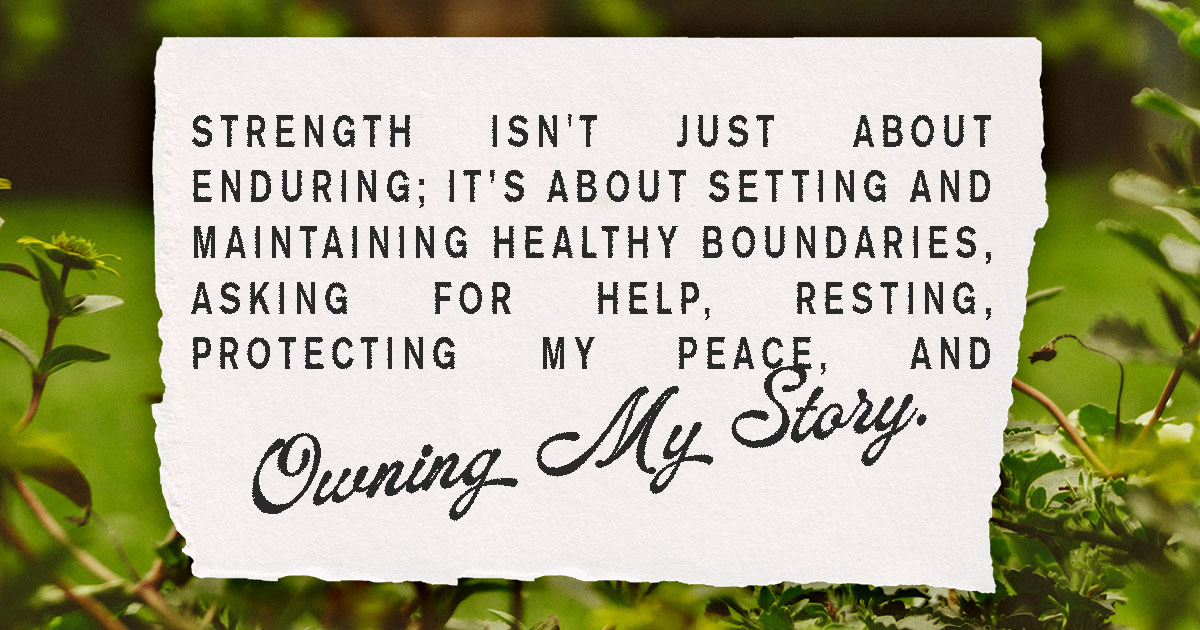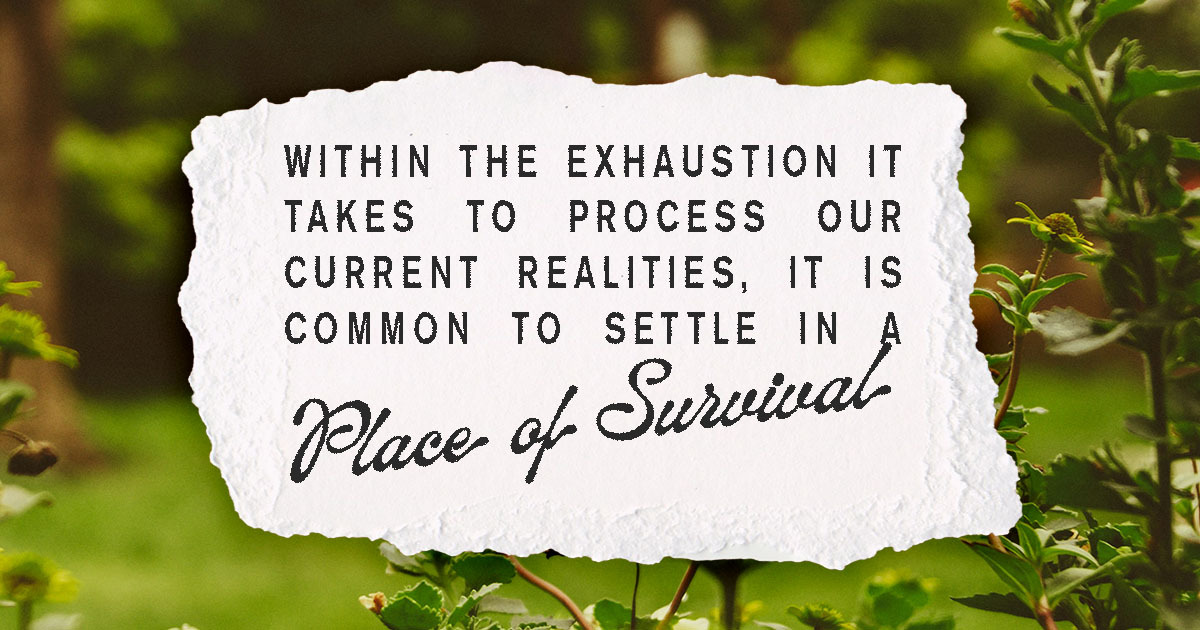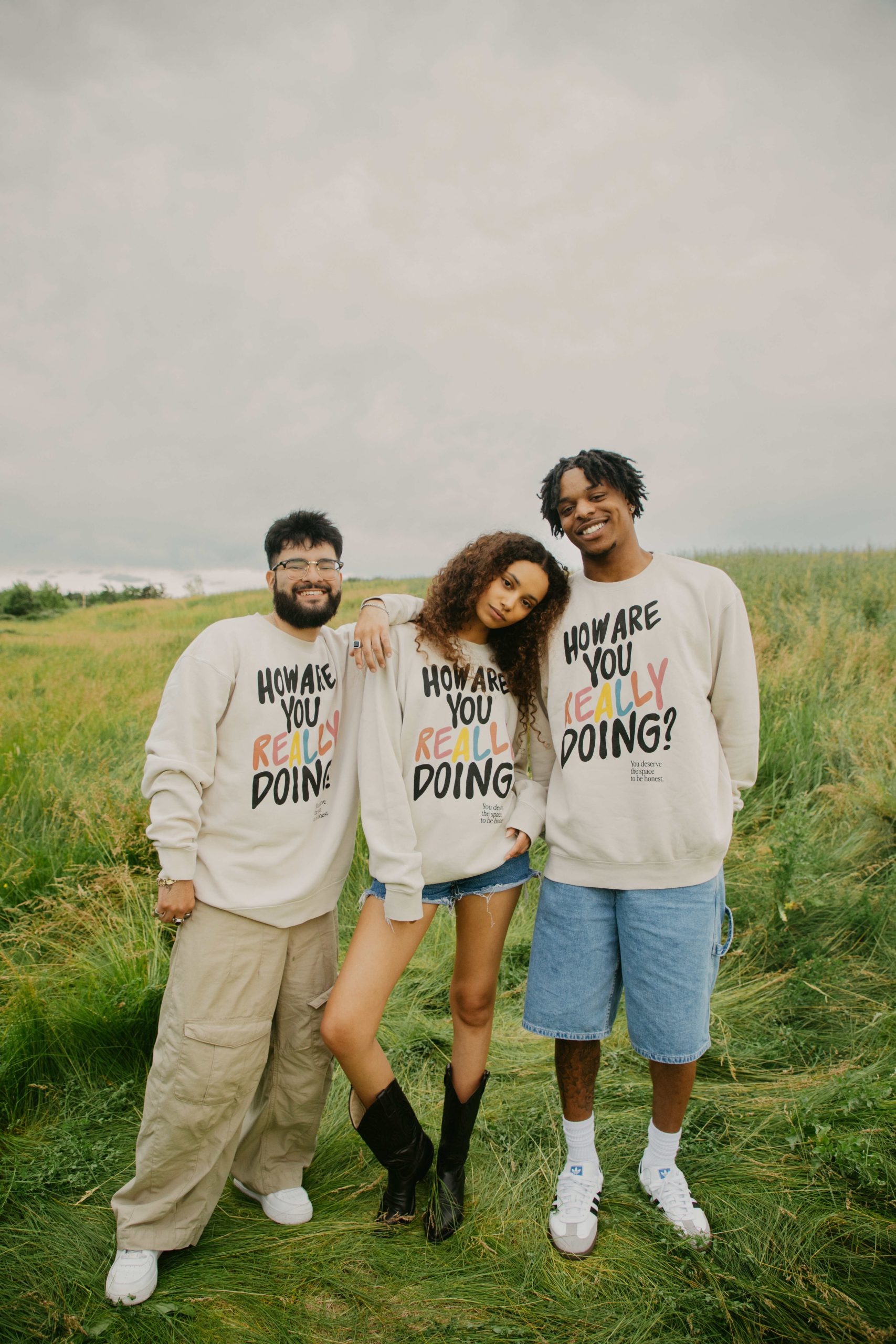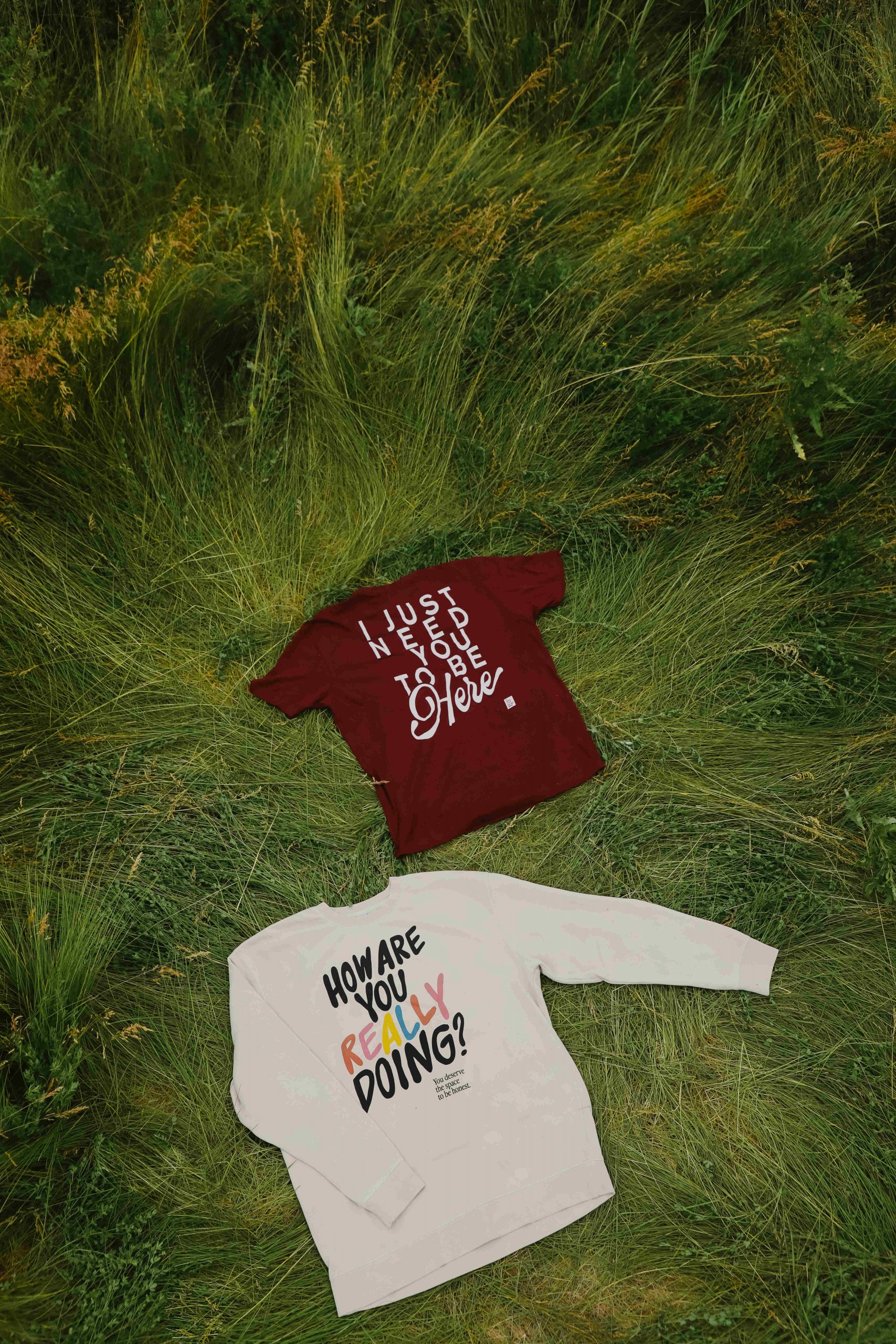Who you are, internally and externally, is beautiful and worthy of respect and kindness. Every single part. The messy, the confusing, and the parts yet to be explored. The intersections of your identities and your experiences with them deserve room for vulnerable exploration. This is how healing starts. July is BIPOC Mental Health Month and it’s a distinct moment for us to hold space for your honesty, your joy, and your pain.
There are so many cultural, societal, and generational beliefs that tell you you must be strong in order to exist. That your pain cannot be expressed. That your presence must be sturdy yet only seen in the background. That your needs, especially when it comes to your mental health, are not worthy of time, energy, and attention.
In honor of BIPOC Mental Health Month, we want to examine the way we look at things like “strength” and “resilience.” But we could not redefine anything without the courage and vulnerability of the following TWLOHA team members who have willingly shared their experiences as BIPOC women, mothers, daughters, and people. These four individuals are bringing four statements to light in hopes of changing the narrative and the mental health landscape for the better. May you feel seen and held.
I don’t need you to be strong. I just need you to be here.
By Auslyn James
When I close my eyes, my thoughts align with my current state—exhaustion. I am drained, both mentally and physically. As a mother, wife, daughter, ambitious professional, and friend, I feel the weight of it all. I am weary of smiling through pain, pushing through adversity, and enduring without support. What I crave is a helping hand.
It’s not that I hesitate to ask for help; the dilemma lies in finding someone to ask. Society often assumes that as a Black woman, I must inherently be strong. When I reach out, the responses are predictable: “You’ll get through it,” or as my island family would suggest, “Drink some tea,” or the classic, “You’re strong—you’ll be fine.” But what does that even mean? Historically, BIPOC (Black, Indigenous, and People of Color) communities have borne the brunt of colonization, slavery, racial segregation, and systemic discrimination. Strength has been synonymous with enduring and navigating these profound challenges. Today, the pressure persists—not just in the fight for equality but simply to exist.
There’s an unspoken expectation for us to embody the “strong” stereotype in BIPOC communities. I am exhausted from the need to smile through adversity because it’s assumed I’m inherently resilient. In a world where rest is relegated to the afterlife, strength becomes a burden, masking our true selves.
So, who am I? I am your friend. I am your neighbor. I am your daughter. I am your colleague. Perhaps it’s time we all rethink what strength truly means.
For me, strength isn’t just about enduring; it’s about setting and maintaining healthy boundaries, asking for help, resting, protecting my peace, and owning my story.
Strength means reclaiming control over my narrative, rights, and opportunities. It’s about navigating the multi-dimensional challenges that stem from historical and contemporary injustices, while also celebrating and preserving cultural identity. It involves fostering community solidarity, resisting oppression, and ensuring BIPOC voices are heard and valued.

Who cares about society’s definition of strength? My definition allows me to celebrate my strength authentically. It enables me to not just exist but to be fully present and impactful.
“I don’t need you to be strong. I just need you to be here.”
By embracing this, we can start living a truth that transcends mere survival, empowering us to thrive in every aspect of our lives.
There is beauty in softness.
By Sheena Grosshans
In a culture that values productivity, strength, and resilience, it can be hard to see the value of leaning into our vulnerability. In a crisis, the human body is almost designed to resist productivity and turn inward, giving time and space for healing. As a result, we need outside help to literally stay alive. We are wired to need others—and that is profoundly beautiful. When we are weak, we can let others be our strength. And in turn, we learn to be soft with ourselves and find our own strength.
I lost my mother in a tragic car accident when I was 17, a child on the cusp of adulthood. It was the spring of my senior year, and in the midst of my journey toward independence, I found myself more in need of a parent than ever.
It took me three years to see that though. Consistent friendship, compassion, and support, showed me that I needed help to process my grief, my new adulthood, and my altered future. Hunkering down and muscling through life was breaking me. As I leaned into therapy in the hands of loving counselors, I also leaned into the fullness of myself and learned that there is a powerful strength in embracing my softness.
There is such beauty in the way we show kindness to others and ourselves, in the way we embrace tender moments of vulnerability and let our guard down. This softness allows us entry to spaces where we find healing and strength, not just for ourselves, but for those around us.
I realized that navigating my own journey through my crisis with softness toward myself would not only honor my story and allow me to emerge victorious, but enable me to be the strength others around me needed as they navigated their own crises.
The world tells women, especially women of color, that we need to act like we have no limits, that we are strong, and that we MUST be strong to overcome our history and any issues plaguing our families of origin. There are good reasons that we have learned that strength against adversity is the way forward, but it is not the only way through. There is beauty in softness, and not only that but a deeper strength as well.
As we navigate our journeys, let’s honor the beauty of being soft. Let’s celebrate the courage it takes to be gentle in a harsh world, to show empathy in times of pain, and to extend love when it’s needed most. Let us lean into the strength it takes to need kindness and help from others, so that one day we may know how best to give it when the world needs it most.
Prioritize thriving. You were never created just to survive.
By Jade Dallam
It is easy to get swept up in the monotonous routine of what we classify to be everyday life. While everyone has the same 24 hours in a day, sometimes it can feel like 24 hours isn’t enough. When factoring in our awareness of the world’s current events and systemic inequalities, life can become overwhelming and exhausting. Within the exhaustion it takes to process our current realities, it is common to settle in a place of survival, but it is also valuable to realize that there is a difference between surviving and thriving.

To survive, in essence, means to “get by”—living life and doing just enough to make it to and through the next 24 hours. Thriving is using the 24 hours we are given and taking it to another level—setting goals and making strides to reach a sense of self-satisfaction and fulfillment. We were never intended to merely survive. Thriving can enhance the physical, mental, spiritual, and emotional aspects of life. BIPOC communities have been silenced by marginalization and oppression too many times to count throughout history and still within the present day. Ideas have been stolen, voices have been censored, and the argument for basic human rights has been held in rooms with little to no representation for the impacted parties. It is critical to be aware that EVERY person is capable of contributing something great to their community.
When you prioritize thriving over surviving, you challenge the systems that were created to place limits on you and break cycles of generational trauma.
Thriving can and will look different depending on the individual. A person’s journey to create their own business might not look the same as someone who finds fulfillment in advocacy or community service. Another person’s desire to express themself through art or music can differ from the person who has just started going to therapy and is willing to learn more about their mental health. Prioritizing yourself, your mental health, your happiness, and your goals are all things that weren’t always welcomed or wanted by oppressors—but all of these things are OK to do! Despite the feeling that there isn’t enough time in the day, it is perfectly OK to make time for yourself and the things that will make you feel good. A powerful thing about the desire to thrive is realizing how much of an impact your successes can have on yourself and others. Your willingness to thrive aids in reclaiming the narrative written about BIPOC people. Your initiatives to thrive uplift others within the community and create an environment that encourages its members to reach their fullest potential.
How are you really doing?
By Bri Hagins
“How are you doing?” A four-word question that is asked thousands of times a day. We ask and are asked this question as a standard greeting when in reality it is a question that should prompt individuals to reflect and be honest about how they are truly doing. Particularly in BIPOC communities, we often choose to mask our true feelings. Walking around with a smile on our faces while we are crying and screaming for help on the inside.
When you come from a culture where you were never taught to be authentic about your feelings or how to even identify them, it becomes second nature to suppress your emotions.
To dishonor yourself by not being truthful about what you are dealing with. Whether the reason to suppress is because of potential judgment, the feeling that no one will understand, people may laugh or tell you that “you’re crazy,” or whatever ingrained belief that we have about transparency and vulnerability—we choose not to.
Maybe the thought of telling someone how you are really doing reminds you of a time when you actually decided to be honest and you were taunted and told to take a nap or pray about it or to be strong. All of which only serve to reinforce the habit of wearing a brave face. If you have experienced this, please know that you deserve a space to be truthful about how you are really doing—despite the societal downplay of asking a question that has the potential to change someone’s life.
So, the next time you are asked how you’re doing, think about how you’re really doing before giving a generic response. And when you decide to ask a friend, co-worker, family member, or anyone else how they are doing, think about the potential impact you could have by instead asking: “How are you really doing?”
Proceeds from this collection will help us fund Treatment & Recovery Scholarships for those in BIPOC communities. Having a competent, understanding, and encouraging space to explore and honor your emotions and traumas is essential when it comes to the journey of healing. You deserve to be seen and you deserve to feel safe.
Shop now in our Online Store here.
You deserve space and support to feel, process, and heal from the heavy you carry. We encourage you to use TWLOHA’s FIND HELP Tool to locate professional help and to read more stories like this one here. If you reside outside of the US, please browse our growing International Resources database. You can also text TWLOHA to 741741 to be connected for free, 24/7 to a trained Crisis Text Line counselor. If it’s encouragement or a listening ear that you need, email our team at [email protected].


Araceli Barrientos
How to help my daughter with Depression?
TWLOHA
Araceli,
Would you email our team at [email protected] so we can offer some support and resources?
With Hope,
TWLOHA
Pingback: Navigating Life When Your Emotional Landscape Changes Cyclically – TWLOHA